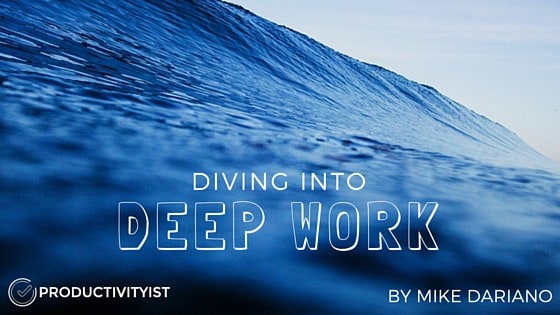
What is the most valuable work you do?
I’m willing to bet it doesn’t have to do with email, meetings, social media statuses or updating websites. Rather, your best work pushes you to your creative limits, generates value, and is of the very best quality.
Author Cal Newport’s new book Deep Work focuses on this kind of work. He defines deep work as work performed without distraction that pushes your cognitive capabilities to their limit. This is the work that creates value, improves your level of skill and is also hard to replicate.
When it comes to producing deep work, Newport suggests this formula:
High-Quality Work Produced = (Time Spent) x (Intensity of Focus)
Newport writes if you’re willing to do these things, then you’ll start to create work that stands out in a noisy world. But it won’t be easy.
There’s a constant whirlwind of shallow work that that begs for our attention. Shallow work feels fulfilling because it’s easy and requires little focus. This is the kind of work that is easier to multitask and doing it makes us feel productive. But in reality, this type of work is not as rewarding as deep work. Shallow work is like the sirens of the seas, momentarily gratifying but not the final destination you want.
To cultivate a deep work habit, here are a few guidelines from Newport:
- Deep work is a skill. This skill must be developed before you can do it in an effective manner. Deep work is a lot like playing the guitar, not flossing your teeth. When you take this into consideration, it changes how you approach focus.
- Quit social media. Social media is an “any benefit” activity. We think that if any benefit results from an activity it must be good. It’s not. It’s a distraction from deep work. Instead, use that time to further sharpen your focus on the richest parts of your life.
- Do less shallow work. This will give you more control and also more clarity. Over time, continue to minimize the amount of shallow work you do.
- Create rituals. This helps extract as much as possible from your brain. It also allows you to work on the right things at the right times in the right spaces.
- Don’t confuse busyness with productivity. The rare and valuable things you do should be your metric for productivity.
- End the workday at a certain time. Newport recommends closing up shop at 5:30. By creating a constraint you can focus your attention and resources during the workday.
Deep Work is a good starting point for anyone new to Newport or has been a fan (like me). You should read it right now, unless that is, you have a pile of deep work to get through first.
Ready to take these concepts even deeper? Check out Cal Newport’s conversation with Mike Vardy on the Productivityist podcast.